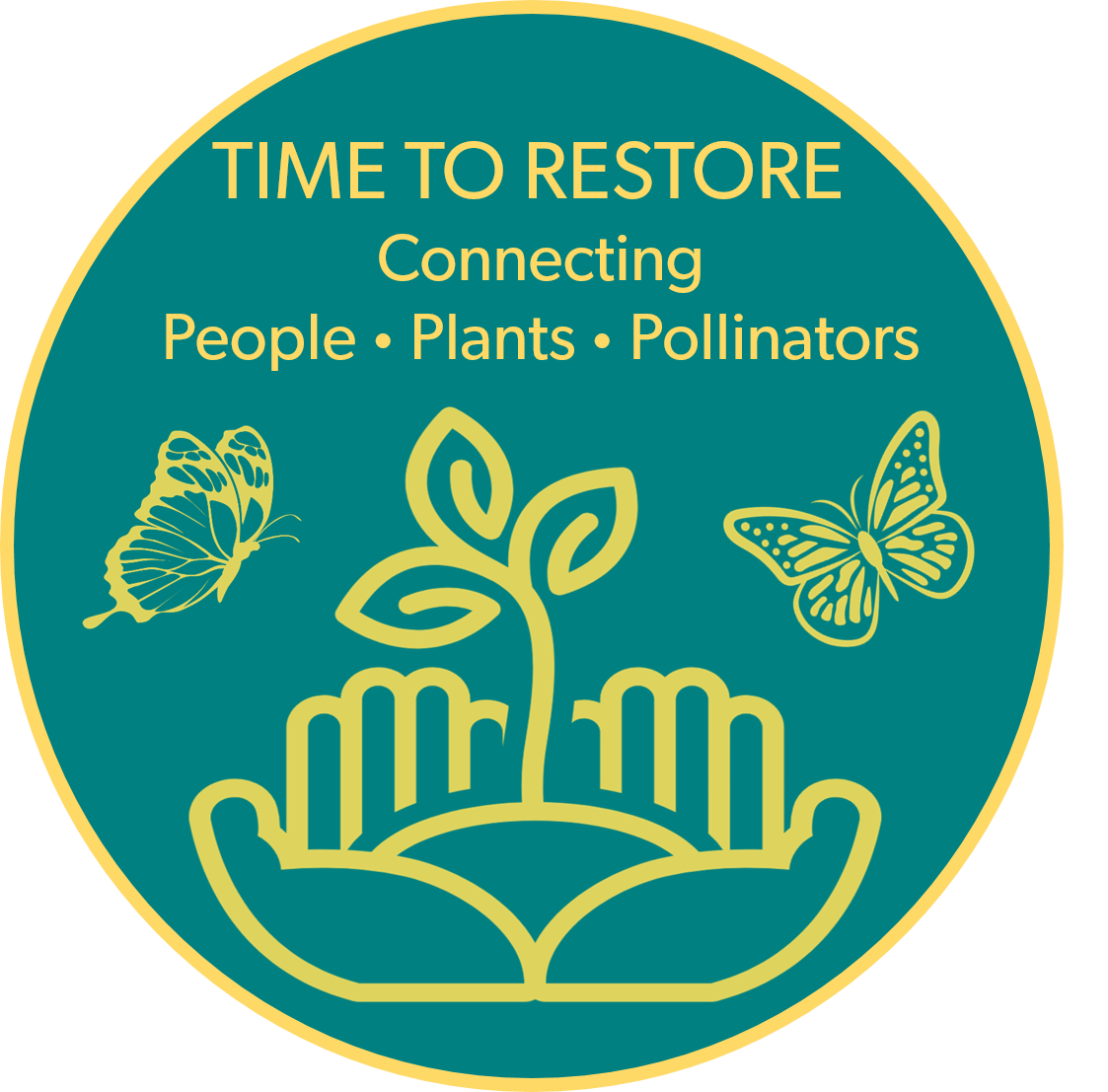
Pollinator restoration has many challenges, from selecting which species to plant to provide nectar during critical periods, to knowing how these plant species will respond to changes in climate including more variable weather conditions. Better knowledge about flowering and seed timing for critical nectar plants, and the links between this activity and climate, can inform more resilient restoration plantings.
We are a team of collaborators from the Bosque Ecosystem Monitoring Program, the Tribal Alliance for Pollinators, the Gulf Coast Phenology Trail, and the USA National Phenology Network, supported by a grant from the South Central Climate Adaptation Science Center. Our project, Time to Restore: Connecting People, Plants, and Pollinators, aims to deliver guidance to those working on pollinator restoration in the South Central region - New Mexico, Oklahoma, Texas, and Louisiana.
We want your input on your needs related to pollinator restoration - what are the species and systems of highest concern to you, where are the gaps in your information about nectar plants, what tools and resources will help you to make informed choices about planting in the face of climate change? Join one of our quarterly calls or collect data on nectar plant flowering and seed timing. Learn more below about how you can participate in this project!
News and Updates for Time to Restore
New species are here! The nine species requested for Time to Restore in Texas have now been added to Nature's Notebook. See the updated list of Time to Restore Texas Priority Species here. We have also added several Time to Restore plants at the genus level including Monarda spp. (bee balms) and Solidago spp. (goldenrods) so that you can more easily observe these hard-to-identify species.
Want an overview of what this project is all about? Watch the recording from our Project Kickoff Webinar in 2021.
![]() Or watch this Texas-focused training presentation by David Gwin recorded on February 26th, 2025.
Or watch this Texas-focused training presentation by David Gwin recorded on February 26th, 2025.
Sign up for monthly updates on the project via our Time to Restore Newsletter.
Learn about the outcomes from the first two years of Time to Restore:
Time to Restore: New Mexico Info Sheet
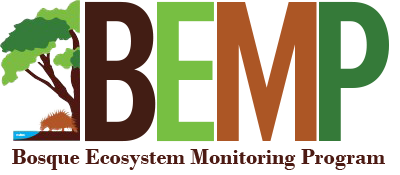
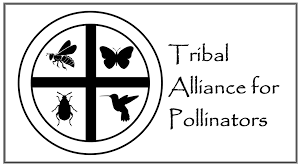
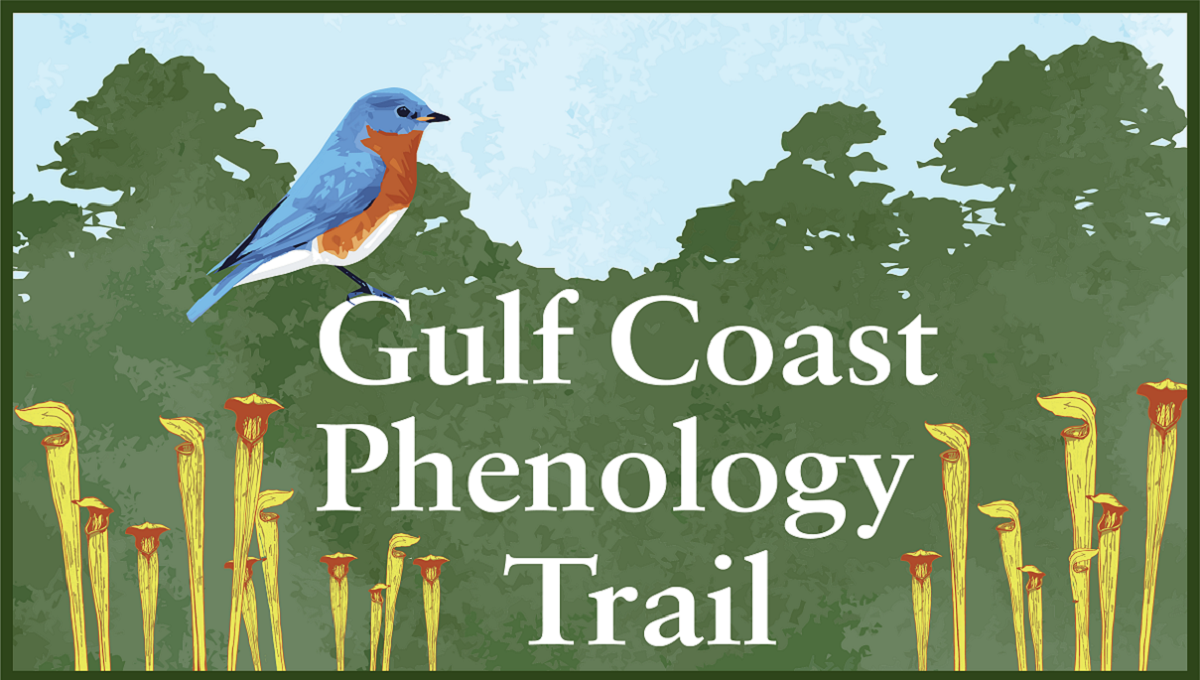

Join our next Time to Restore quarterly call
January TBD
Quarterly calls are a great opportunity to connect with others working on pollinator restoration in the South Central region (NM, OK, TX, and LA) and hear updates from our project team.
At the scheduled meeting time, join via the link posted here.
Collect phenology data with us
Help us collect data on flowering and seed timing of nectar plants this year! There are two ways to contribute to this effort:
1. Submit observations through iNaturalist (great for species identification assistance and one-time observations in a place you don't plan to return to)
2. Collect data through Nature's Notebook (great for repeated observations of the same plants over time)
Sign up for our monthly Time to Restore newsletter to receive updates and resources related to this project:
Register to attend one or more of our monthly Time to Restore training calls on the first Wednesday of the month at 6:30pm CT:
Here are training resources to get you started with iNaturalist and Nature's Notebook (you will need to join Nature's Notebook first).
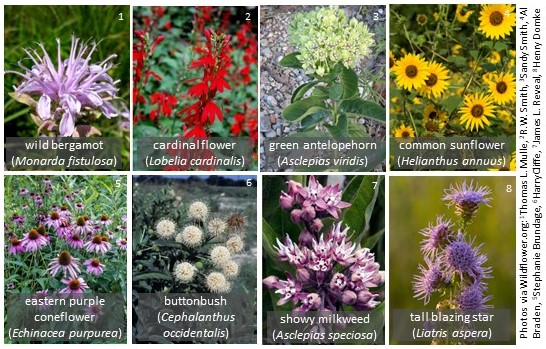
Priority species:
- wild bergamot (Monarda fistulosa; Phenophase Photo Guide)
- cardinal flower (Lobelia cardinalis; Phenophase Photo Guide)
- green antelopehorn (Asclepias viridis; Phenophase Photo Guide)
- common sunflower (Helianthus annuus; Phenophase Photo Guide)
- eastern purple coneflower (Echinacea purpurea)
- buttonbush (Cephalanthus occidentalis)
- showy milkweed (Asclepias speciosa)
- tall blazing star (Liatris aspera)
We recommend following these guidelines for tracking the eight Time to Restore priority species with Nature's Notebook.
We also identified additional priority species for multiple states:
![]() Louisiana priority species are listed below
Louisiana priority species are listed below
![]() Texas priority species are in are listed here
Texas priority species are in are listed here
Texas participants can find Texas-specific guidelines here.
We are developing training videos to support data collection on flowering and fruiting of priority species:
Plant of the Month Series
We also began a new Plant of the Month series in the Time to Restore Newsletter. This series provides observation tips for one of the species on our priority lists. View past issues at the links below:
- November 2024 - Butterfly milkweed, Asclepias tuberosa
- December 2024 - Frostweed, Verbesina virginica
- January 2025 - American beautyberry, Callicarpa americana
- February 2025 - Upright prairie coneflower, Ratibida columnifera
- March 2025 - Blue mistflower, Conoclinium coelestinum
- April 2025 - Blue bonnet, Lupinus texensis
- May 2025 - Showy milkweed, Asclepias speciosa
- June 2025 - Green antelopehorn milkweed, Asclepias viridis
- July 2025 - Mealy blue sage, Salvia farinacea
- August 2025 - Tall blazing star, Liatris aspera
- September 2025 - Wild bergamot, Monarda fistulosa
- October 2025 - Gregg's mistflower, Conoclinium dissectum
- November 2025 - Common sunflower, Helianthus annuus
- December 2025 - Firewheel, Gaillardia pulchella
- January 2026 - Basketflower, Plectocephalus americanus
- February 2026 - Cardinalflower, Lobelia cardinalis
You can sign up for the Time to Restore monthly newsletter here.
Help us spread the word about Time to Restore
Download a post-card sized or bulletin-sized flyer about the project.
Project Resources
Time to Restore Resources for Plant Selection, Grant Opportunities, and more
October 2025 Quarterly Call
In this Quarterly Call we reviewed the information that we delivered in info sheets and a StoryMap at the end of Phase I in 2023, and discussed how we can improve these deliverables for the end of Phase II. We drafted a list of survey questions to get input from our Time to Restore community.
July 2025 Quarterly Call
In this quarterly call we heard updates from State Coordinators and discussed in person vs virtual trainings and what has worked well so far.
View recording »
April 2025 Quarterly Call
In this quarterly call we looked at the data that have been collected so far this year to see what's going well and what we can improve going forward! We also heard updates from state coordinators about recent and upcoming training and other activities.
View recording »
February 2025 Quarterly Call
We heard updates from State Coordinators on training activities and common observer questions and shared an update on the herbarium scoring part of the project.
View recording »
October 2024 Quarterly Call
We heard updates from State Coordinators, met some new Texas participants, and shared an update on the herbarium scoring part of the project.
View recording »
July 2024 Quarterly Call
We heard updates from State Coordinators, shared some new Phenophase Photo Guide resources, and discussed some new options for visualizing open flowers data for nectar plants.
View recording »
May 2024 Quarterly Call
We gave an update on project activities in each state, discussed using a single Time to Restore project for iNaturalist, talked about adjustments to the priority species list, and got feedback on a new training video that shows the difference between unripe and ripe seeds.
View the recording »
January 2024 Quarterly Call
In this call, we shared the final version of our state Info Sheets, went over our goals for Phase II, revisited the priority species list, and got feedback on some training resources in development.
View the recording »
August 2023 Quarterly Call
This was our final Quarterly call for this Phase I of the project. We shared the results from data collection thus far, including flowering and ripe seed calendars and our analysis of climate cues influencing flowering and seed timing. We also shared plans for the next phase of the project that was recently funded by the SC CASC for three additional years.
View the recording »
May 2023 Quarterly Call
In previous calls, we've shared the process that we've developed for determining the timing of the start, peak, and duration in flowering and seeding of nectar plants. In this call we share an update on how this process is working with the Time to Restore data collected so far, as well as show what we've learned about the climate drivers for flowering and fruiting in these nectar plants. We also heard from state leads about their various engagement/training/data collection activities.
View the recording »
January 2023 Quarterly Call
We gave an update on project activities and data collected so far, reviewed results from our phenology calendar survey we sent out last fall, and provided a chance to network with those working on pollinator restoration in the South Central region.
View the recording »
September 2022 Quarterly Call
We heard updates from New Mexico, Oklahoma, Texas, and Louisiana about data collection activities, then took a look at the data that have been collected so far. We share some exciting progress on a prototype phenology calendar showing onset, end, and peak in flowering timing.
View the recording »
May 2022 Quarterly Call
In this quarterly call, we gave an update on the status of the project, heard about activities happening in the different states, and learned about the NPN team's progress on exploring existing phenology data from Nature's Notebook and iNaturalist in the region, particularly efforts to identify peak in flowering timing. We also discussed ideas to get the word out to more potential data collectors to increase the amount of data we have for analysis, including identifying climate drivers to flowering and fruiting timing.
View the recording »
Pollinator Plants and Climate Change Presentation
In this recorded presentation, USA-NPN's Alyssa Rosemartin explains projected changes in climate in the region and the potential impact on plants and their pollinators. Alyssa presented this information as part of our Fall 2021 Stakeholder Workshops.
View the recording »
Seed Collection and Processing Technical Training Recording
In this recorded webinar, learn about native plant seed collection and processing from Jane Breckinridge, Brandon Gibson, and Collin Spriggs of the Tribal Alliance for Pollinators. Jane, Brandon, and Collin covered wildflower identification, harvest timing, seed collection sustainability, and seed processing techniques to ensure successful germination.
View the recording »
Train the Trainers Data Collection Workshop Recording
In this recorded training, learn how you can provide guidance on data collection for others, or just collect data yourself! We provide an overview of the Nature's Notebook and iNaturalist platforms, suggestions on how to select a site and plants for monitoring, describe the training resources available to you, and provide tips on how to train a group of observers where you live.
View the recording »
Training slides
Project overview handout
Kickoff Workshop
The Kickoff Workshop was held online on Tuesday, Oct 12, 2021. The Workshop brought together those working to restore habitat for pollinators, or support nectar plant conservation in the South Central Region (New Mexico, Oklahoma, Louisiana, and Texas). The Kickoff Workshop provided the opportunity to make connections with others working on pollinator restoration across New Mexico, Texas, Oklahoma, and Louisiana, determine what we know currently about the timing of nectar plant flowering and seeding in the Region, and discuss how we can consider all perspectives to ensure that Indigenous data sovereignty and other privacy concerns are addressed in our work going forward.
Workshop Objectives:
- Introduce the project "Time to Restore - Connecting People Plants and Pollinators"
- Introduce considerations for building successful partnerships with tribes
- Understand who is part of the pollinator restoration community in this region
- Share overview of existing relevant data on nectar plant phenology
- Set the stage for state-level workshops in November
State-level Workshops
The Kickoff Workshop was followed by three separate online workshops for participants in each of three states - New Mexico, Oklahoma, and Louisiana. Participants in Texas were invited to join the workshop in the state nearest to them.
Participants had a chance to connect with others in their state working on pollinator restoration, learn about climate change impacts on pollinator plants and other restoration challenges, and give their input on pollinator plant data collection efforts next year at state Time to Restore workshops.
Workshop Objectives:
- Connect with others in your state working on pollinator restoration and conservation
- Learn how to establish partnerships with Indigenous groups in the state, with special considerations for individual Tribes
- Understand the decision-making process for restoration, and how different organizations and groups deal with variable scales, budgets, and other challenges
- Understand climate changes occurring in the state, and the projected changes for coming decades
- Understand how changes are impacting plant flowering and seed timing, and what we can learn from data collection platforms that record these seasonal events
- Give your input on priority species, locations, and monitoring guidelines for data collection efforts across the state beginning in early 2022
PROJECT COLLABORATORS
Project team:
Jane Breckinridge, Tribal Alliance for Pollinators
Theresa Crimmins, USA National Phenology Network, PI
Robert Croll, Great Lakes Indian Fish and Wildlife Commission
Kim Eichhorst, Bosque Ecosystem Monitoring Program
David Gwin, Contractor
Gina Lloyd, Contractor
Erin Posthumus, USA National Phenology Network
Past team members:
Gail Bishop, Gulf Coast Phenology Trail
Hayley Limes, USA National Phenology Network
Cynthia Naha, South Central Climate Adaptation Science Center
Alyssa Rosemartin, USA National Phenology Network
April Taylor, South Central Climate Adaptation Science Center
Sue Wilder, Gulf Coast Phenology Trail
This work is supported by The Department of the Interior South Central Climate Adaptation Science Center, which is managed by the U.S. Geological Survey National Climate Adaptation Science Center.
Questions? Email Erin Posthumus at [email protected].
Additional Priority Species for Louisiana:
- Goldenrods, Solidago spp.
- Butterfly milkweed, Ascelpias tuberosa
- Eastern baccharis/Groundsel, Baccharis halimifolia
- Giant ironweed, Vernonia gigantea
- Common elderberry, Sambucus nigra
- Coral honeysuckle, Lonicera sempervirens
- Blue mistflower, Conoclinium coelestinum
- Red maple, Acer rubrum
- Maypop, Passiflora incarnata
- Rattlesnake master, Eryngium yuccifolium
- Mexican Hat, Ratibida columnifera
- Swamp sunflower, Helianthus angustifolius
- Aquatic milkweed, Asclepias perennis
- Bee balm/bergamot, Monarda spp.